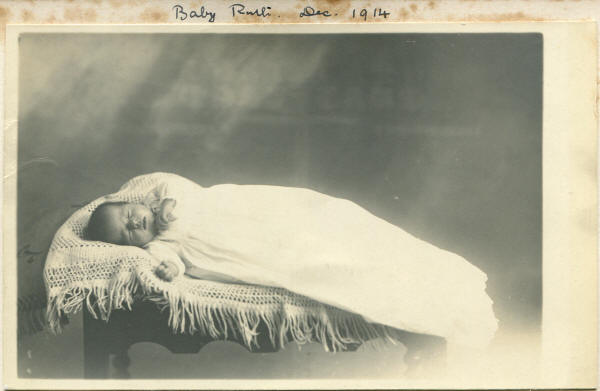
Ruth Pollard was born at 10:20 on the evening of Thursday the 19th November 1914, at 8 Clifton Dale, York. She weighed 7 lbs, and her mother found her "such a sweet, pretty baby", though she had "rather a flattened nose". Almost from the very first she seemed to notice things, and looked very intelligent. After her first week she began to sleep pretty well, and was extremely good in the day, hardly ever crying and rarely being nursed. She usually slept at night after her 10.00 feed till 2.00, then again till 6.00, but sometimes cried for two or three hours. She was first photographed in mid-December 1914. At eight weeks she weighed 10 lbs 5 oz, and was 21" long.1

In March 1915 she visited her grandmother's home at Bensham Grove, Gateshead, for the first time, where she was "as good as gold—lay on the seat, awake part of the time."2
In May she suffered the first of a series of ear abscesses. Her first tooth came through on the 26th May, and on the 9th August 1915 her mother began to wean her, initially giving her Cow and Gate milk; "she behaved better than we expected". By the 7th September she was totally weaned. In November that year she had a mild attack of chickenpox. At the beginning of 1916 she was constantly ill for around two months, with influenza and bronchitis. She had to be in a room heated to at least 60o F. day and night, which in that winter's very cold wet weather her parents found difficult. At the end of May she came down with whooping cough. On the 3rd August 1916 she took her first five steps unaided. She had stopped using 'napkins' before that year's summer holiday. By November she could say a good many words. On the 13th of that month she rode a horse for the first time, with Willy Morrell, in her Aunt Bertha's field. In January 1917, after a week's stay at Bensham, Mary Pollard noted that
Mother thinks her quite different from the other children whom she thinks are like their Father. Little Ruthie, she says, is a Richardson.
The following month Mary noted "She can run now & is growing big & fat, & is, alas, quite a little girl, but she looks so much stronger than this time last year." In June her mother recorded the following delightful anecdote:
Ruthie was rather feverish & I had her on my knee in the drawing room. She looked up at Margy's picture & said "Margy's laughing". I said "yes", then "Margy's got eyes" yes. "She's got nose" yes. "She's got no legs".3
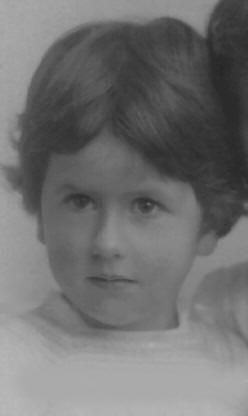
In early 1918 Ruth was much troubled with her ears and her chest, and while staying at Bensham in 1918 succumbed to measles. Her chest problem caused initial puzzlement among the doctors her mother took her to, and she was X-rayed to aid the diagnosis. By May there was less doubt: Ruth was suffering from rickets. She was prescribed cod liver oil, plenty of fatty food, breathing exercises and lots of fresh air (though not too much walking), calcium phosphate, and the removal of her adenoids. Her illness was not taken lightly, and at one time it was thought doubtful whether she would live to be five years old.4
In July 1918 her mother noted that "Baby who often sleeps with us now, often wakes in the night & says 'Mummy'. 'What darling'? 'I love oo' & then drops off to sleep again." The New Year's family party at the close of that year was memorable:
Robert repeated, with action, dressed in F's coat & hat "when this frightful war is over, no more foreign trash I'll buy", & Ruthie "I had a little doggie & he cd sit & beg"—then played, cat & mouse (2 rows of chairs) musical chairs, up jenkins, had a Sir Roger de Coverly, Ruthie doing it so sweetly, chumps, etc. M. & I played a duet, & the children sang with F. in parts, "Oh who will o'er the downs"—we played whistle game & sang Auld Lang Syne.5
In January 1919 Ruth stayed with her Mother at Bensham Grove for the last time, but eventually had to be sent home, as Elizabeth Spence Watson was so ill that Mary Pollard had to spend her whole time nursing her. "Mother says Ruthie is an angel", Mary noted, though. She kept exclaiming, about her, "wie schön, wie schön".6
In 1919 Ruth had a feverish cough and "a horrid, sneezing cold", and in May and June that year she was ill again with tonsillitis (initially thought to be possibly a diphtheric throat) and a severely ulcerated throat. In July she had acute colitis, for which anti-phlegistine gave great relief, and Lazenby's Soups were a great boon. A specialist Mary Pollard took her to in Manchester feared there were signs of consumption, and advised great care. Partly for reasons of health, her mother was by now giving her tuition in reading, poetry, botany and sewing.7
At five Ruth disliked being called plain 'Ruth', preferring 'Ruthie.' On Christmas Eve 1919:
Ruthie got three threepenny bits out of her moneybox days before Xmas, wrapped them up & kept looking for them & then gave them to me. Carols, letters to Santa Claus etc; Ruthie did not want to send one for she said "he never brings me what I want."! Children woke in middle of night—Ruthie very bothered because I wd not let her look at her stocking . . .
On Christmas Day at Burton Croft Ruth, Caro and Billy Morrell were still "completely mystified" by the appearance of Father Christmas. On the 25th January 1920 Ruth was taken for her first ride in a motor car; she hardly spoke a word throughout the 50–60 mile drive, and came back "awfully, awfully tired". On her mother's birthday in February that year, as Mary Pollard noted:
Children perfectly sweet. Ruthie so excited kept waking in night & wanting to get up! . . . orange from Ruthie—bought when out with me a few days previously with her own penny—I was supposed to know nothing about it (she still hides like an ostrich!)8
In July 1920:
We all went to tea in B's garden at a chapel "do". M. & Ruthie got prizes for egg & spoon races & M. for skipping. (Ruthie's was only agst 1 wee girl who began to cry!).'9
Around 1920 Mary Pollard wrote to her husband:
Thou would have liked to see Ruthie writing her little letter & hear her remarks—"Hasn't Farvie got a lovely face? He'll have to give himself the hugs; I can, myself—look" and her little arms went tight around her own neck! She is an enchanting little mortal, & I hardly know how to bear the thought of sending her to school. Could we get one or two children & teach them together till thou gets a post?10
In January 1921 her mother noted:
Ruthie can now read beautifully, quite difficult books & with a great deal of expression. She is lovely to teach. She is slower about writing, but quick at sums, & is very clever all round I think. I cannot bear to send her to school yet, we are so happy together.11
In the following month she wrote:
Ruthie scratches people occasionally when cross; I thought she was doing it to me (it was a mistake) & gave her hand a sharp slap. The poor wee thing cried bitterly & said afterwards "I can tell you how many times you've slapped me Mummy, three times." I hope I'll never do it again.12
As a child, Ruth remembered going in a bathing machine, going to see a car, and the arrival of the first grapefruits. She used to get 1d a week pocket money. The children used to play 'houses' behind the curtains of their parents' four-poster bed. Ruth had a nurse; and she used to love being called 'Miss Ruth' by the maids. She kept a pet hen called 'Tiny'.13
The family moved to Reading in 1920 (first to Whiteknights House, then in 1923 to 9 Denmark Road). The 1921 census finds her at Whiteknights House (twelve rooms), 29 Eastern Avenue, Reading, living with all her family except her brother, as well as a German domestic servant and an Austrian schoolboy. Until summer 1922 Mary Pollard taught Ruth writing, reading, spelling, arithmetic, geography, grammar, French, music, poetry and singing, sewing, nature, etc. She even took her through her primary and elementary piano exams (R.A.M. & R.C.M.) (1925 and 1927). On the 20th September 1922 she began to attend school at Miss Benwell's 'Clooneavon' school, a private school with, at that time, only one other pupil. In December, as her mother recorded, "Miss Benwell says Ruthie is "brilliant." She says 'I've had a great experience of teaching & R. is quite exceptionally clever. I'm really afraid of her getting on too quickly: she keeps up with the other girls of 12 & 14 in most things'. There are now 4 pupils." In 1923 Ruth holidayed with her family in Switzerland, at Gimmelwald and Spietz. Once, when Ruth was eight, her parents were too ill to go to Meeting and Ruth insisted on going alone and was very indignant when well-meaning Friends suggested she sat with them. She insisted on sitting on her parents' usual bench. When about 8 she herself had mumps. From the 8th May 1924 she went to the Abbey School, where she won the 1925 and 1926 Arithmetic prizes (in 1925 she had also been top in the spring French exam, with 97 out of 100; she was top in the 1926 midterm exam, and in the July Arithmetic and English exams; in the latter term she had a perfect attendance record, for the first time), the 1927 Maths and Latin prizes, the 1928 English and Latin prizes, and the 1929 Latin & Greek prize.14
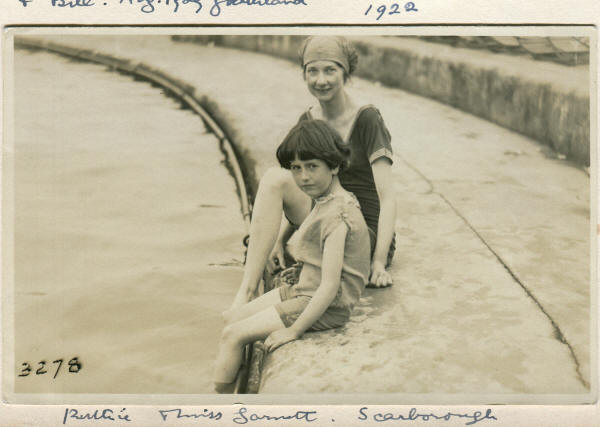
Ruth remembered the General Strike of 1926, and a student driving a tram. In that year she submitted a crossword of her own compilation to the Children's Newspaper, though it was not accepted for publication.15 By August 1926 Ruth was swimming competently, and was learning to dive. At the age of twelve, though now studying Algebra and Latin, "she preserves her childhood & is at this moment playing with her dolls beside us."16
At the turn of 1926–7 Ruth was 4 ft 7¾ in tall, weighed 5 stone, took size 5 gloves and size 3 boots. By the end of March she had gained 5lbs and ¼ in. At the end of August 1927 she underwent an operation for the removal of her tonsils and adenoids, under chloroform, at home. She professed not to enjoy school, but in her March exams came first in four subjects. During April and May that year Ruth learned to ride a bicycle.17
Ruth was at the Abbey till 1929, having had a double remove in the last year, to the middle fifth. At 14 (on the 24th July) she won a Bronze Medal and certificate for Life Saving. In February 1929 she came top in five exams—arithmetic, geometry, French, Latin and Greek (having only begun studying the latter in October 1928). At the beginning of March 1929, under her father's supervision, she took the scholarship exams for the Mount School, York. She did very well, with an average percentage of 76, as opposed to her nearest rival's 59, and was awarded a Barclay scholarship worth £70 p.a. for two years, with a third year made up to £60 or £70. In July, though, Ruth failed her first exam (New Testament), though still came top in Latin and Greek. She left the Abbey School on the 25th July.18
In September 1929 the family holidayed on Arran. That month she began school at the Mount from September 1929, where she continued until 1932, spending two years in Bedroom 20, then one in 13. She was initially very homesick at boarding school, but was soon taken under the wing of her aunt Bertha Morrell. She joined the school Scientific Society, and the Junior Branch of the League of Nations Union, while there. In November 1929 she received an honourable mention in the junior competition of the Reading LNU, but the following month she only received a consolation prize. In March 1930 Ruth was ill with influenza for three weeks. In September that year she passed the Higher Certificate in English, but only School Certificate in History; though she got 'Good' in French, and didn't fail in any subject, Ruth was certainly disappointed, describing her results as "The Death of all my ambitions!" in the diary she kept at the time, and in later years remembering that she was "shattered" at the news.19
At the turn of 1930–31 Ruth was 5 ft 4⅞ in tall, weighed 8 st. 10 lb, wore size 7 in hats, 7 in gloves, and 5 in boots.20
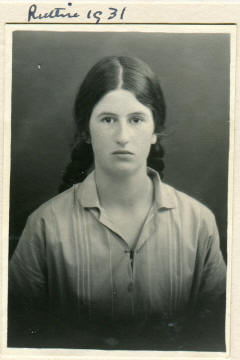
For a month from mid-December 1930 to mid January 1931 Ruth was laid up with scarlet fever; for part of this time she had to be treated in a private ward at the isolation hospital in Acomb, at 5 guineas a week. Around the end of August 1931 Ruth spent a fortnight on holiday with her family at S. Germain des Vaux, in Normandy.21
In her last year at school Ruth was a senior (prefect)—with her own little study (having previously had to share)—and in her last term was second Head, and Head of Crossways; this was the term she enjoyed most, appreciating her new responsibilities. Ruth always maintained that boarding school had made her responsible, and had given her a sense of independence. She was remembered by one teacher for her cheerful friendliness.22
In March 1932 Ruth was awarded the Helen Doncaster Scholarship, to go abroad for a bit. In July that year she passed her School Certificate in German. That summer she experimented with putting her hair up, and after leaving school in December 1932 began to wear it this way all the time. In April 1933, as her mother noted:
Ruthie had her hair bobbed. I felt miserable, for she looked so sweet & uncommon with it up in 2 plaited buns at the back (low down) but she says she can't get hats to fit & she is lazy about it too, so now looks more like everyone else. Suppose I'll get used to it, but I don't like it at all!23
In February and March of 1933 Ruth sat the Somerville entrance and scholarship exams for admission to Oxford University, but was unsuccessful. Ruth spent the summer of 1933—thanks partly to Hugh Richardson, who had sent her mother £25 expressly for this purpose—on a university course in Dijon, on the Côte d'Or, to improve her French, staying from 5th May to 18th July at 4 Rue de Montchapel, Dijon. While there, she "had a very gay time", and fell in love with a Scot called Alec Grant, but the relationship failed to survive her return.24
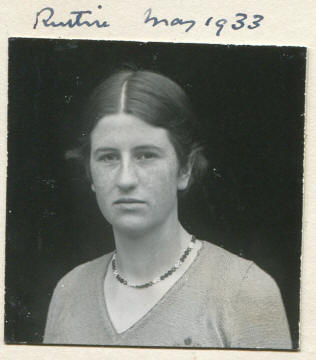
In September 1933 Frank and Mary Pollard were considering what was best for Ruth, the two main options being for her to go to Birmingham, or to Reading with the option of a second stab at the Oxford entrance exam. Their decision (Mary's diary doesn't suggest that Ruth had any say in the matter) was for the second of the two. Accordingly, in October 1933 Ruth was admitted to Reading University. In November she re-sat the Oxford entrance exams, for which she had worked very hard. She was unsuccessful, but in the end was not unduly disappointed, for she was enjoying Reading, and wanted to stay there. In her first year at Reading she studied French, Latin and Logic. From her second year she majored in French. In her spare time she attended International meetings, played badminton, and went sculling, as well as to dances and other University activities. She rowed in fours, for the University. She was a member of St David's Hall—the college for students who lived at home; from 1933 to 1935 she was on the Committee of St David's Hall. In her last year at college she learned to drive a car.25
In the summer of 1934 Ruth spent six weeks—for the first week accompanied by her mother—on holiday in the Harz mountains in Germany, staying at Villa Auerbach, Hahnenklee, Oberharz. While there, she heard Hitler's radio broadcast on the occasion of Hindenburg's burial. On her return Mary Pollard thought her both taller and fatter; she also thought Ruth had grown more unselfish while away.26
Early in 1935 Ruth moved house, with her family, taking up residence at 22 Cintra Avenue, Reading.27
On the 19th June 1935:
Ruthie wanted to celebrate her 21st birthday in advance by a river supper party. There were going to be 15 of us, her Univ. friends & ourselves, & we had an extra special supper with strawberries & cream to take on the river (6–10) (about 6½ lbs. straws. cost 7.6) Just as we were going to start it began to pour. It was terribly disappointing. Ruthie then took them all to the cinema & they came back here for a picnic supper & went away about 10.30. They seemed to enjoy it.28
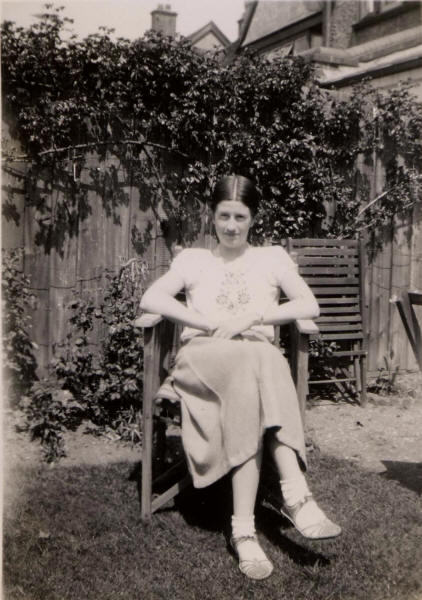
Ruth Pollard, taken by Florence (the maid), 1935
In July Ruth holidayed with her family and her then boyfriend John Dix at St Merryn, near Padstow, in Cornwall.29
At the beginning of August 1935, Ruth left to spend a year in France. She started out as an au pair, teaching French for 2 hours to a girl of 16 (c/o M. Perrin-Pelletier, 54 Rue Victor Hugo, Firminy, Loire—a residence Ruth described as a mansion, with three maids, chauffeur and gardener); then near the end of September to Mandiargue, near Nîmes. She spent the Christmas period in Marseilles, and spent a few days in Venice in February (which caused her mother some concern, as it was during the Italo-Abyssinian War). From February to the end of June 1936 she attended foreigners' courses at the University of Montpellier, where she took the Licence in English and German. At Montpellier she lived c/o M. Teissier du Cros, at 12 Rue Salle L'Évèque, in a house once occupied by André Gide. In February 1936 she passed the Diplome d'Études Françaises, and in June the Certificat d'Études Supérieures. Her French professor commented on "the particular fluency" of her spoken French; in giving her a reference he also said "my considered judgment of her is that she is a young woman of upright and sterling character; her manners are very pleasing." While in France she was sufficiently interested in Friends (and missing Meeting) to subscribe to the Echo des Amis. On leaving Montpellier, she went on a walking tour in Alsace, with friends.30
In September 1936 Ruth had a letter published in the Reading Standard, protesting against the showing of military parades at the cinema during the national anthem.30A
While Ruth was in France, John had been stricken with consumption, and had to go to a sanatorium on the Isle of Wight. Though Ruth visited him there in November, this seems to have marked the end of such relationship as they had had.31
In March 1937 Ruth went on a Hellenic tour, entirely on her own. This was her last holiday before her final exams in June. At the end of June she heard she'd gained her B.A. (Hons) in French, with a II.2; she attended the degree presentation ceremony on the 3rd July. A few days later she left for a fortnight's holiday in Ireland, with her parents.32
On 30th August 1937 Ruth began an 8-month course at the Triangle Secretarial College in Oxford Street, London. She liked the work, but she had to work hard, and found it quite tiring.33
Though she had been out with a couple of other men since her romance with Alec, from November 1937 Ruth began going out with Norman Kirby [later to be head of security and intelligence, and official interpreter, to Field Marshal Montgomery], her most serious relationship prior to her marriage. This did not, however, prevent her from going out with two other men friends in early 1938.34
Before completing her course at the Triangle in April 1938, Ruth had ten days' holiday with her family in the Netherlands.35
At the beginning of May Ruth worked a week in her brother Robert's solicitor's office. At the end of the month she took a temporary job at the British Council, but didn't like it. In early June her tutor at Reading wrote the following reference for her:
I understand that Miss Pollard is hoping to find a secretarial post. I judge her to be well suited for such work. I know her well and have formed a high opinion of her character. She has high standards and would carry out her duties conscientiously. She will, I think, prove to have the capability for initiative. She has an alert and attractive personality and very pleasing manners.
Finally she secured a nine-month post working for the Mines Trading Company Ltd, in the Shell-Mex building in London. Rather than commute from Reading, she took a bedsitter at 25 Ampthill Square, London N., for the duration, returning to Reading for weekends. At the end of September 1938 she had a fortnight's holiday back in Montpellier.36
By February 1939 Ruth was suffering from a tubercular gland in her neck (she had suffered swollen glands three years earlier, though this may be unconnected). The gland was surgically removed at the end of March. The consultant advised Ruth that she ought not to return to office work for a long time, ought not to work in London again, and should aim to be in the open air all summer. She managed a full month in Cornwall in May, which did her good, but didn't cure her fully. At the end of June she was a guest at the wedding reception for Elizabeth Jean Hawkins and Philip Henry Herford, at the Mansfield House Hotel, Reading.37
On the day war was declared—3rd September 1939—Mary Pollard noted that Ruth had been so tired she fell asleep while making her bed.38
The 1939 Register, in September, recorded her as a secretary, living with her mother and her elder sister Caroline at 22 Cintra Avenue, Reading. At the beginning of October Ruth worked again for Robert Pollard, at his new office in Ealing; he had been asked by publishers to write a book about social conditions in war time, and as it had to be done in a great hurry he needed her assistance.39
On the 30th October 1939 Ruth started work for the Papermakers' Association, at their temporary office in the Honeymoon Suite of the Great Western Hotel in Reading. She worked there till early February 1940.40 In January 1940 Ruth met Norman Kirby's mother for the first time, which Mary Pollard took as implying a new seriousness in their relationship.41
Later that year Ruth responded to a magazine advertisement and secured a post as Guesthouse Assistant at The 19th—a café and guesthouse in Overcombe, just outside Weymouth, where she started work on the 20th May. Paid 15/- a week, she worked there ten weeks. From this coastal position she was able to witness a number of bombing incidents against shipping in Weymouth Bay, and saw a plane shot down on the 13th July. Eventually the café was forced to close, because of the threat of invasion, and Ruth returned home on the 27th July.42
On the 30th August Ruth was on a shopping expedition in London when she experienced four air-raids. "Danced in Shelter!", her diary recorded, defiantly.43
At the end of September Ruth got a job with Huntley & Palmer's, showing visitors round their biscuit factory. Then she again worked for a spell with the Mines Trading Company, which had been evacuated to Reading. From the 21st October she worked for Broderick's, a hire-purchase furniture firm, evacuated to Christchurch Road.44
While working for Broderick's, Ruth joined a Badminton
Club. About this time the Royal Army Pay Corps approached the badminton club,
asking them for women members to play with, and it was as a result of this
initiative that she met [A1] Sidney Beck, in
N![]() ovember 1940. The first reference in Ruth's diary is the laconic "Badminton—Beck brought me home", on the 15th November. Two days later they went to a
concert together—an RAF concert in which the main item was Dvořak's New World
Symphony. On the 17th December, the couple became engaged, after only going out
together six times. Four days later Ruth went to see Norman Kirby, and broke off
what had almost been her engagement with him; though Norman had been rather
distressed at the news, Mary Pollard felt that he had never really been in love
with Ruth. The engagement was formally announced on the 28th December, on which
date Sidney bought Ruth her ring, a large sapphire with a diamond each side.45
ovember 1940. The first reference in Ruth's diary is the laconic "Badminton—Beck brought me home", on the 15th November. Two days later they went to a
concert together—an RAF concert in which the main item was Dvořak's New World
Symphony. On the 17th December, the couple became engaged, after only going out
together six times. Four days later Ruth went to see Norman Kirby, and broke off
what had almost been her engagement with him; though Norman had been rather
distressed at the news, Mary Pollard felt that he had never really been in love
with Ruth. The engagement was formally announced on the 28th December, on which
date Sidney bought Ruth her ring, a large sapphire with a diamond each side.45
On the 3rd May 1941 Ruth left Broderick's, and took a
month's rest before the wedding. It is clear that Ruth had grave doubts about
marrying a soldier, but was somewhat mollified by the knowledge that he had
formerly attended meetings of the Peace Pledge Union, and that he was a non-combatant; the marriage
would later be placed under considerable strain when Sidney went on active
service. At any rate, the couple married at 2:30 pm on Saturday 7th June 1941,
at the Friends' meeting house in Church Street, Reading. On her marriage
certificate Ruth is described as a Sho![]() rthand Typist, of 22 Cintra Avenue,
Reading. Sidney and Ruth delayed buying each other wedding rings until the 20th
December.46
rthand Typist, of 22 Cintra Avenue,
Reading. Sidney and Ruth delayed buying each other wedding rings until the 20th
December.46
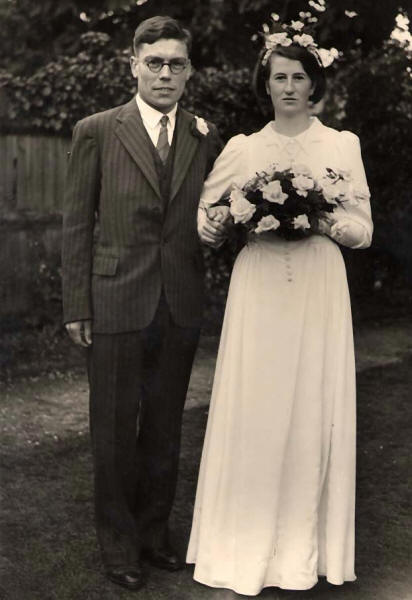
The Reading Standard46A reported that
The wedding took place at the Friends' Meeting House on Saturday of Mr. Sidney John Thomas Beck, son of Mr. and Mrs. R.A. Beck, of 225, Marlborough Road, Gillingham, Kent, and Miss Ruth Pollard, B.A., daughter of Mr. and Mrs. F.E. Pollard, of 22, Cintra Avenue, Reading.
The Bride wore an ankle length gown of white crepe-de-Chine and carried a bouquet of yellow roses and wore similar roses in her hair. The two small attendants were Rowland and Rosemary Dale (nephew and niece of the bride). The little girl was in a white silk dress smocked with green and carried sweet peas. She had similar flowers in her hair. The boy wore a white silk blouse with green tie and green knickers. The former work a green and gold pendant and the boy a gold tiepin, the gifts of the bridegroom. Mr. Edgar Beck (brother of the bridegroom) was best man.
The wedding lunch and reception were held at 22 Cintra Avenue. The couple then took a week's honeymoon at Hope Cove, South Devon, "rather marred for me," Ruth noted, "by fibrositis in my neck—possibly due to fear of cooking when we got home." They returned to their new home at 44 Culver Lane.47
At this point Ruth took a part-time secretarial job with the Friends' Schools' Careers adviser, at Leighton Park school. Soon afterwards she was called up, but she registered as a Conscientious Objector. At the end of October she was interviewed by the registration authorities, and 'got off' by offering to do part-time voluntary work. Two weeks later she started work with the British Federation of University Women, which had been evacuated to Reading; she found the work interesting, but at the end of November noted that "now I am doing a voluntary job I always work overtime." From late February she was doing paid work for the BFUW, getting 30/- a week; she was being encouraged to think of herself as more than just a shorthand typist. She worked there till at least June 1942. Her final conscription papers arrived when she was in the nursing home just after Daniel was born (at the end of May 1943), so she was no longer liable.48
From November 1941 to 1945, Ruth was a stalwart contributor to Mass-Observation. Also, with Sidney, she established a branch of Federal Union in Reading, of which on the 1st January 1942 they became joint secretaries. By September 1942 she was also a member of the Friends' Service Council.49
In May 1942 Ruth was deeply upset by Sidney's decision to volunteer for the Royal Armoured Corps, noting in her Mass-Observation diary that "I was terribly upset, partly because of the danger, but chiefly because nothing could have trampled much more severely on my conscience—that I, who believe all killing to be wrong & futile (I would willingly sacrifice myself in the cause of freedom, but not kill) should be helping to feed, etc., someone who had deliberately chosen the most efficient & foul method of killing (not that these were Sidney's reasons) seems too awful." Next day, too, she "Cried most of the morning" . . .50
By June 1942 they were actively trying to "bring a new life into this world where there is so much destruction." But it seems that Ruth had a miscarriage at the beginning of August.51
In mid-September she attended a Federal Union conference in Reading, and was photographed with her father, Count Karolyi [former prime minister of Hungary] and others for the Reading Standard. At the end of that month she attempted, unsuccessfully, to register for firewatching. At the beginning of December, on a visit to London, she walked to her old house in Ampthill Square, to find only the outside still standing; unsurprisingly, this "Came as quite a shock." On the evening she saw Sidney off to Wrotham for OCTU [Officer Cadet Training Unit] training (28th December 1942) Ruth "Spent the most miserable evening of my existence." 52
Before Daniel was born, Ruth moved back to Cintra Avenue, where she had two rooms at the top. Perhaps as a distraction in the later stages of her pregnancy, and in Sidney's absence, Ruth began teaching herself Esperanto in March 1943, and during April managed to read the whole of Mark's Gospel in Esperanto. The baby was due on the 7th May, but in fact was more than two weeks overdue. Ruth and Sidney were to have four children: Daniel (1943), Julia (1945), Lucy Ruth (1948), and Benjamin Sidney (1951).53
On the 31st October 1943 Ruth and Daniel went up to Scotland, to join Sidney who had been posted there, at 2 Fairlie Avenue, Kilmarnock. This was expected to be a longish posting, but within a fortnight Sidney had been reassigned to Norwich, and Ruth and Daniel returned to Reading.54
For most of April 1944 the family were reunited in Bournemouth. The course of the war from June onwards proved a terrific strain. On D-Day itself,
Poor Ruthie came down to breakfast in tears. She had listened to the 7.0 a.m. news & there had been nothing particular, but the 8.0 o'clock said the 2nd. Front invasion had begun during the night. It is terribly hard for her & the whole day was an awful strain wh. will go on for months. [. . .] She is very plucky.55
At the end of March 1945, the strain on her parents having become too great with two children now present, Ruth began house-hunting. In July Ruth, Daniel and Julia moved to 20 Fortis Green Avenue, London N2, a house obtained with the assistance of Ruth's brother Robert.56
Ruth and her sister Caro were able to vote in a general election for the first time in their lives, on the 5th July 1945. Ruth celebrated VE day with a Friend, at Alexandra Palace. With the children, she spent three weeks with her parents in Reading, around the turn of the year 1945/1946; the reunited family spent a further six days there at the end of June, as well as Christmas week that year. They spent a further three days there in November 1947; later that month Ruth went to St James's Park to watch Princess Elizabeth's wedding procession. In February 1948 the family again spent three days with Ruth's parents in Reading. In July 1948 she was presented to Princess Alice, at Senate House. The family spent a fortnight at Mushroom Cottage in August 1948. In April the family, including young baby Lucy, spent a week in Reading. In June 1949 the family were filmed by the Realist Film Unit, for a documentary for the Central Office of Information. Ruth didn't see the finished product until January 1951, though. It was released as Your Children's Play.57
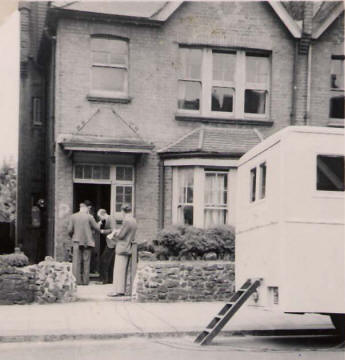
20 Fortis Green Avenue, 1949
At this period Ruth employed a char, "a very nice Yorks. lass". At one time she had a man char. One char had worked for a famous murderer (possibly John George Haigh, the acid-bath murderer).58
In April 1950 the family spent ten days with Ruth's parents in Reading, spending a further four days there at the end of October; Ruth also spent two days there in March 1951, immediately after her father's death, which occurred just a week after the family had holidayed in the Isle of Wight with her parents. In June 1951 the family visited the centre of London, to see the Festival lights. In September, they visited the Festival of Britain site, and in October had a last celebration in London, with an evening visit to the Battersea Pleasure Gardens.59
The family had now reached four children, and it was clear that a larger house was in order. Additionally, as Ruth recorded, "we decided to leave London, when I found Julia couldn't remember seeing a cow." On the 26th October they moved to St Albans, taking a 5-bedroomed house at 50 Clarence Road. "It was the day the General Election results were announced & we just got the wireless working in time to hear that Mr. Churchill was the new Prime Minister."60
In politics Ruth was always a Liberal, although she had once nearly joined Fenner Brockway's Independent Labour Party. She joined the local Liberal association three weeks after moving to St Albans, and took an active part in Liberal affairs for the duration of the family's residence there.61
In March 1953 Ruth produced a one act play for the Further Education Centre Drama Class. Later her interest in amateur dramatics saw her spend five years in the chorus of the local operatic society (she sang contralto), where she appeared in productions of Gilbert & Sullivan's HMS Pinafore (1955), Utopia Ltd (1956), etc. (She had seen her first Gilbert & Sullivan—The Mikado—at the age of eight). In 1959 she acted in a French play, Topaze, for the Franco-British Society, of which she was a keen participant for many years, from at least 1957.62
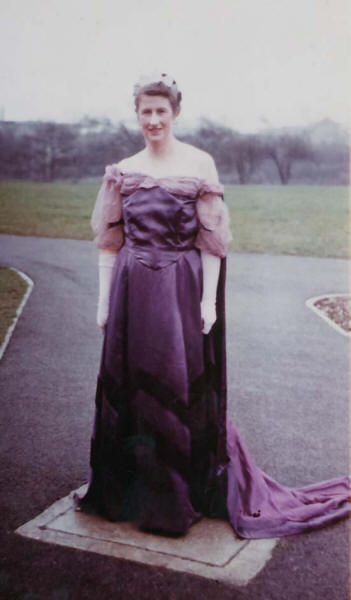
In costume for Utopia Ltd, 1956
In June 1953, to celebrate the occasion, Ruth produced a special Coronation Day dinner for the family.63
By February 1955 Ruth was Chairman of the local Women's Liberal Association. In the summer that year, with Sidney and their two eldest, she holidayed at Mondiargues, in France. From early 1957 till at least May 1963 she was a member of the (national) Liberal Party Education Committee. In 1958 she took part in a Brains Trust for the Nursery Schools Parents' Association, and took the chair at an area meeting addressed by the then Director General of the Liberal Party, Herbert Harris, who was at that time working on the production of a new education policy for the party. She enjoyed being able to attend the party conference in Torquay in September 1958.64
In April 1960 Ruth, with her family, undertook the first day of the Aldermaston March, but hurt her leg, resulting in thrombo-phlebitis. She also marched part of the way the following year, and attended the Trafalgar Square rally.65
On the 11th May 1961 Ruth stood as Liberal candidate for Fleetville ward, in the St Albans city council elections. Her election address described her as Vice-President of the St Albans Liberal Association, Vice-Chairman of the local WLA; member of the Liberal Party Education Committee; member of the United Nations Association, the Franco-British Association, the St Albans & Hertfordshire Architectural & Archaeological Association; and Patron of the St Albans Operatic Society. In the election she increased the Liberal vote by over 50%, but came third out of three candidates, with 394 votes.66
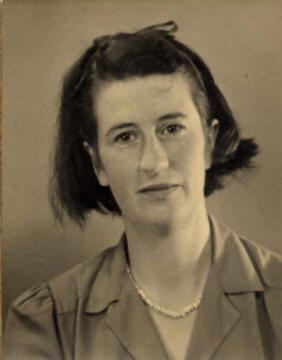
In the summer of 1961 she spent two weeks with the family on a cruise round the Baltic, visiting Copenhagen, Stockholm, Helsinki and Leningrad. The following year they holidayed in Cornwall.67
After her mother died, Ruth bought and planned the conversion of a narrowboat, Fern (before conversion, the boat cost £450), on which the family holidayed for several years.68
In May 1963 Ruth again stood as Liberal candidate for Fleetville, coming third in the election (out of three), with 491 votes—but a further improvement in Liberal performance. She was still Vice-President of the St Albans Liberals. She was now (December 1962) Liberal representative on the St Albans Branch Committee of the National Council for Women, and their representative on the International Sectional Committee. In addition to her 1961 society memberships, she had now joined the Civic Society. Her electoral address recorded that "Education, cultural and recreational facilities and road safety are my chief interests" . . . In the summer of 1963 she holidayed with the family in Italy. In April 1964 she contested (unsuccessfully) the St Albans East ward in the Hertfordshire County Council elections.69
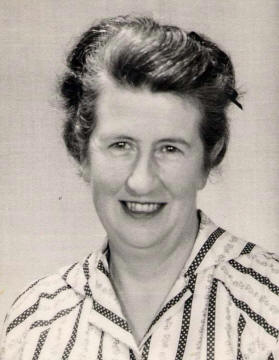
In 1961 Liberals had put her name forward for nomination as a Justice of the Peace. But the invitation, when it arrived in June 1964, was unexpected. Her name was formally placed on the Commission of the Peace on the 20th November that year. She was sworn in on the 1st December, and attended her first court on the 12th. She first attended Quarter Sessions on the 24th February 1965. Ruth was to realize that her service as a JP was the work she most wanted to do.70
In the summer of 1966 Ruth holidayed with some of her family in Greece. In May 1968, with Sidney, she holidayed in Paris at the time of the near-revolutionary events there. The following summer they holidayed in Northumberland. 1970–1972 saw summer holidays in Austria, Norway and Switzerland.71
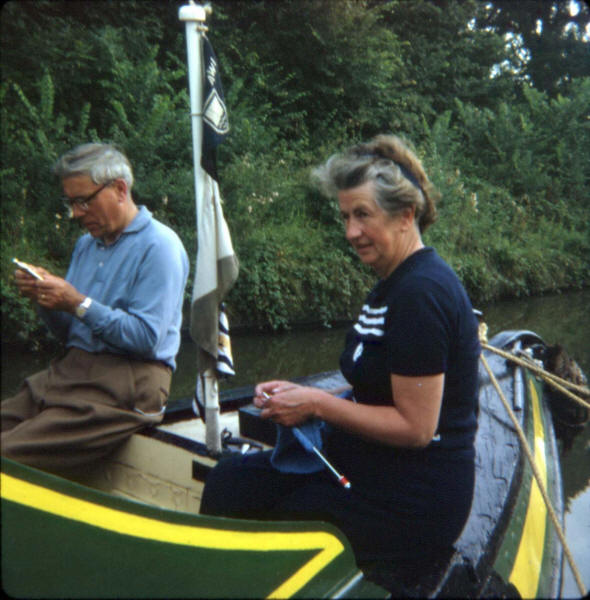
Sidney and Ruth on the Fern, 1968
Ruth's interest in road safety led her to take a seat on the St Albans Road Safety Committee and on the executive committee of the Pedestrians Association for Road Safety. From 21st October 1970 she also undertook work for the Pedestrians' Association, at their London office; this was once a fortnight, for travel expenses and luncheon vouchers only. She continued in this role until the spring of 1972. As of March 1972 she was still a Vice-President of the St Albans Liberal Association. On the 4th November 1972 she addressed Meeting for Sufferings on her concern about road safety, and (May 1976) had an article on the subject published in Quaker Monthly. She was disappointed with the outcome (though her concern had been fully supported at the time), but she lived to see one of her concerns, the wearing of seat belts, reach the statute book. She resigned from the Pedestrians' Association Committee on the 8th May 1975.72
Some time between 1969 and 1973, she became a governor of the St Albans Grammar School for Boys (later Verulam School).73
Ruth was always keen on linguistics and languages. From the 1960s onwards, she took—and passed—GCE O-Levels in Russian, Italian and Spanish; she later did evening classes in Norwegian, and attempted Ancient Greek.74
Ruth chaired the St Albans Women's Liberal Association for ten years. Early on, she was on the General Purposes Committee of the WLA, and made herself unpopular by asking questions; Ruth later learned that they even held a special meeting to discuss throwing her out of the Association, but didn't do so. At some stage she became President of St Albans Liberals, in which capacity she had to preside at the Annual Dinner, as well as (26th January 1968) entertaining the then party leader, Jeremy Thorpe. She gave up the Presidency on the 7th March that year, coming off the Executive for the first time for 16 years.75
By 1972 she had resumed the Vice-Presidency, finally standing down as Vice-President of St Albans Liberals in April 1974.76
In 1973 she holidayed with the family at Goathland, in North Yorkshire. In the early summer of 1975 Ruth and Sidney holidayed in the French Pyrenees. The following spring they took a fortnight's cruise in the Canaries.77
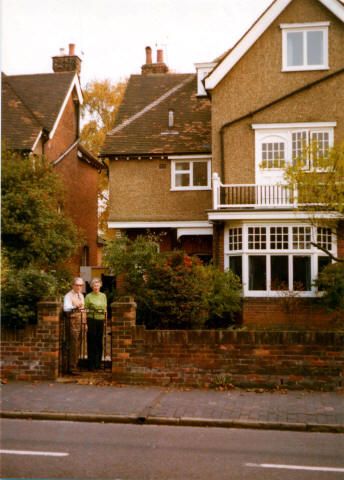
50 Clarence Road, 1976
After Sidney retired, in 1975, Ruth was in a position to fulfil her dream of retiring to her beloved Yorkshire. They began house-hunting in January 1976, initially in Skipton and Ilkley, straightaway being impressed by the latter. She took her last court at St Albans on the 8th September. On the 26th October 1976, she and Sidney moved to 44 St James Road, Ilkley, W. Yorks., which she had first viewed in June. Ruth was re-appointed as a JP on the Keighley bench, with effect from 11th November (re-sworn 8th December) 1977. Her first court was at Bingley, on the 6th February 1978.78
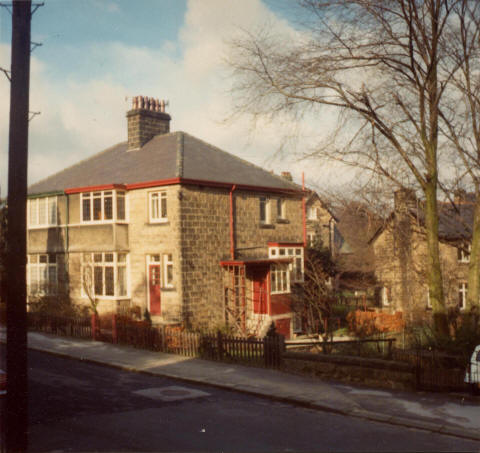
44 St James Road, 1977
On the 14th September 1978 Ruth had a 'giddy' attack in bed, but recovered in time to go to court at Bingley. A fortnight later, on the 1st October, Ruth suffered a 'cerebral spasm', collapsing in the kitchen. She was admitted to Otley Hospital on the 4th, and was kept in till the 13th. Thereafter she was never really well. On the 17th November 1979 Ruth had a second cerebral spasm—more in the nature of a mini-stroke, leaving her physically weaker, but with all her mental faculties unimpaired. Her specialist was unable to improve her condition without side effects which would among other things have involved her giving up her magistrates' work. Ruth, however, believed the quality of life was more important than its length. Nonetheless, she had long been happy to try alternative medicine, including homeopathy, naturopathy, and chiropractic.79
In the spring of 1979 Ruth and Sidney holidayed in Kos and Mykonos, with Margaret and Reg Dale. In Ilkley, Ruth was a member of the Civic Society, Olicana (the Ilkley local history society), Wharfedale Naturalists, the Liberal Party Association, UNA, and the Ilkley Peace Action Group. On the 30th May 1980, when the Quaker Peace Action Caravan came to Ilkley, she carried a sandwich board in procession through the shopping centre.80
On the 28th May 1981 Ruth made her will. A fortnight later she returned to Hope Cove, with Sidney, for a ruby honeymoon. In the spring of 1982 Ruth and Sidney took another holiday in Norway. When, in October 1982, the specialist advised her that unless he altered her prescription, he could do nothing more for her, she took a firm decision to continue her normal life, although not expecting that the end would come so soon. Ruth was last at Court at Keighley with a domestic court on the 29th November 1982, as as Chair of No. 1 Court the day after.81
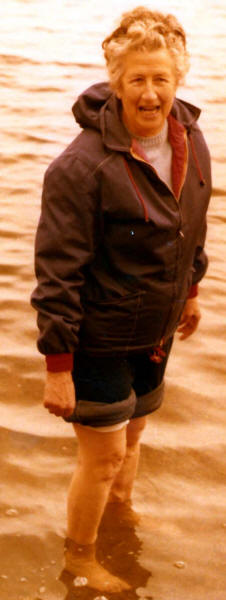
c. 1980/81
Sidney and Ruth, 1981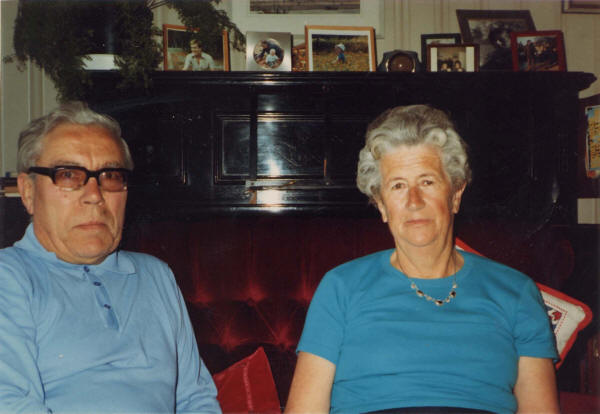
As a JP her decisions were invariably fair and justice was duly tempered with mercy so far as she was concerned. She was held in high regard by her colleagues for her good sense and ability to express herself freely. Friends testified to her perfect honesty in speaking truth and love and to her faithfulness to Friends' testimonies, which had been a help and example to man; she always maintained her witness to temperance. Ruth's finely-tuned conscience kept her always in the mainstream of Quakerism. However, "except for the fact that this Quaker background has influenced all my beliefs," Ruth noted, "I have never really been a religious person." Had she not been a birthright member, it is doubtful whether she would have faced being visited in early adulthood to justify her membership.82
She was the possessor of a lively sense of fun and a loveable disposition, with a capacity for making and keeping friends, combined with the ability to articulate the firm principles which she upheld with an engaging honesty, humour and compassion.83
On Sunday, 5th December, she attended a fund-raising coffee-evening in support of the Greenham Common women. On Wednesday, 8th December, Ruth had been swimming (including practising lifesaving), when she suffered chest and back pains. The doctor called out that night gave an incorrect diagnosis that it was not as serious as feared, and she died at home at 4:45 the following morning, just before the arrival of the doctor on a second visit—in pain, though not at the end. The cause of her death was given as rupture of the heart, myocardial infarction, and coronary artery atherosclerosis. Ruth's body was cremated at 2pm the following Thursday, at Skipton Crematorium.84
Her will was proved at Leeds on the 21st February 1983, her estate being valued at £20,006.85
Ruth Pollard was the youngest child of [I2] Francis Edward and [M1] Mary Spence Watson Pollard.86
1 birth certificate; diaries of Mary S.W. Pollard (Ms); Mary S.W. Pollard: Ms book on early life of Ruth Pollard (2 vols); The Friend LIV:878, 1914-11-27
2 diaries of Mary S.W. Pollard
3 diaries of Mary S.W. Pollard; Mary S.W. Pollard: Ms book on early life of Ruth Pollard
4 diaries of Mary S.W. Pollard; letters from Frank Pollard; Mary S.W. Pollard: Ms book on early life of Ruth Pollard; letters of Mary Pollard; Sidney Beck: Testimony to the Life of Ruth Beck of Ilkley Meeting, and the two earlier drafts
5 diaries of Mary S.W. Pollard
6 letters of Mary Pollard; diaries of Mary S.W. Pollard
7 letters of Mary Pollard; Sidney Beck: Testimony to the Life of Ruth Beck of Ilkley Meeting, and the two earlier drafts; diaries of Mary S.W. Pollard; Mary S.W. Pollard: Ms book on early life of Ruth Pollard
8-9 diaries of Mary S.W. Pollard
10 letters of Mary Pollard; Mary S.W. Pollard: Ms book on early life of Ruth Pollard
11-12 Mary S.W. Pollard: Ms book on early life of Ruth Pollard
13 Sidney Beck: Testimony to the Life of Ruth Beck of Ilkley Meeting, and the two earlier drafts
14 Sidney Beck: Testimony to the Life of Ruth Beck of Ilkley Meeting, and the two earlier drafts; Ruth Beck: Memoirs; music books in my possession; prize details from certificates pasted into the books awarded; my own knowledge; Mary S.W. Pollard: Ms book on early life of Ruth Pollard; Minute 27 from (presumably) Ilkley preparative meeting, 27 Mar 1983, on the life of Ruth Beck; TNA: RG 15/6012 RD121 SD3 ED21
15 Mary S.W. Pollard: Ms book on early life of Ruth Pollard
16 Ruth Beck: Memoirs; letters from Frank Pollard; Mary S.W. Pollard: Ms book on early life of Ruth Pollard
17 Ruth Beck: Memoirs; letters from Frank Pollard; diaries of Ruth Pollard; my own knowledge; Mary S.W. Pollard: Ms book on early life of Ruth Pollard
18 Ruth Beck: Memoirs; medal & certificate in my possession; Mary S.W. Pollard: Ms book on early life of Ruth Pollard
19 Ruth Beck: Memoirs; Sidney Beck: Testimony to the Life of Ruth Beck of Ilkley Meeting, and the two earlier drafts; interview with Sidney Beck, begun Easter 1986; 1929 LNU membership card in my possession; diaries of Ruth Pollard; diaries of Mary S.W. Pollard; Mary S.W. Pollard: Ms book on early life of Ruth Pollard; The Friend LXX:851, 1930-09-19; Reading Standard, 1929-11-16; Reading Standard, 1929-12-14
20 diaries of Ruth Pollard
21 diaries of Ruth Pollard; letters from Frank Pollard, diaries of Mary S.W. Pollard
22 letters from Frank Pollard; Sidney Beck: Testimony to the Life of Ruth Beck of Ilkley Meeting, and the two earlier drafts; diaries of Mary S.W. Pollard; Mary S.W. Pollard: Ms book on early life of Ruth Pollard
23 diaries of Mary S.W. Pollard; Mary S.W. Pollard: Ms book on early life of Ruth Pollard; Yorkshire Post and Leeds Intelligencer, 1932-08-27
24 Ruth Beck: Memoirs, diaries of Ruth Pollard; Ruth Pollard's postcard album, in my possession, or her other postcards in the possession of Julia Whitaker; diaries of Mary S.W. Pollard; Mary S.W. Pollard: Ms book on early life of Ruth Pollard
25 Ruth Beck: Memoirs; letters from Frank Pollard; information from Sidney Beck; Sidney Beck: Testimony to the Life of Ruth Beck of Ilkley Meeting, and the two earlier drafts; Ruth Pollard's postcard album, in my possession, or her other postcards in the possession of Julia Whitaker; diaries of Mary S.W. Pollard; Mary S.W. Pollard: Ms book on early life of Ruth Pollard; Reading University references for Ruth Pollard, 1938
26 Ruth Beck: Memoirs; letters of Mary Pollard; diaries of Ruth Pollard; letters from Frank Pollard; diaries of Mary S.W. Pollard; Mary S.W. Pollard: Ms book on early life of Ruth Pollard
27 Ruth Pollard's postcard album, in my possession, or her other postcards in the possession of Julia Whitaker; Visitors Book, Frank & Mary Pollard, 1928-61
28-29 diaries of Mary S.W. Pollard
30 letters from Frank Pollard; Ruth Pollard's postcard album, in my possession, or her other postcards in the possession of Julia Whitaker; Ruth Beck: Memoirs; documents now at West Sussex RO; photograph albums of Ruth Pollard's; diaries of Mary S.W. Pollard; Mary S.W. Pollard: Ms book on early life of Ruth Pollard; Reading University references for Ruth Pollard, 1938
30A Reading Standard, 1936-09-25
31 diaries of Mary S.W. Pollard
32 Ruth Beck: Memoirs; documents now at West Sussex RO; photograph albums of Ruth Pollard's; diaries of Mary S.W. Pollard; The Friend 95:666
33 Ruth Beck: Memoirs; interview with Sidney Beck, begun Easter 1986; diaries of Mary S.W. Pollard
34-5 diaries of Mary S.W. Pollard
36 diaries of Mary S.W. Pollard; Ruth Beck: Memoirs; interview with Sidney Beck, begun Easter 1986, S.J. Beck 'Snaps' album, 1920s–1930s
37 diaries of Mary S.W. Pollard; Reading Mercury, 1939-07-01
38 diaries of Mary S.W. Pollard
39 1939 England and Wales Register (TNA: RG 101); diaries of Mary S.W. Pollard
40 Ruth Beck: Memoirs; diaries of Mary S.W. Pollard; diaries of Ruth Pollard
41 letters of Mary Pollard
42 diaries of Mary S.W. Pollard; diaries of Ruth Pollard; Ruth Beck: Memoirs; interview with Sidney Beck, begun Easter 1986
43 diaries of Ruth Pollard
44 diaries of Mary S.W. Pollard; interview with Sidney Beck, begun Easter 1986; Ruth Beck: Memoirs; diaries of Ruth Pollard
45 Ruth Beck: Memoirs; Sidney Beck: Testimony to the Life of Ruth Beck of Ilkley Meeting, and the two earlier drafts; diaries of Ruth Pollard; diaries of Mary S.W. Pollard
46 diaries of Mary S.W. Pollard; Ruth Beck: Memoirs; marriage certificate; Wedding book of Sidney Beck & Ruth Pollard; Ruth Beck's Mass-Observation diary (D 4247); The Friend 139:756 1981-06-12
46A Reading Standard, 1941-06-13
47 Ruth Beck: Memoirs; letters of Ruth (Pollard) Beck; diaries of Mary S.W. Pollard; letters from Frank Pollard; Ruth Beck's Mass-Observation diary (D 4247); Frank and Mary Pollard visitors' books
48 Ruth Beck: Memoirs; interview with Sidney Beck; begun Easter 1986; Sidney Beck: Testimony to the Life of Ruth Beck of Ilkley Meeting, and the two earlier drafts; Ruth Beck's Mass-Observation diary (D 4247); Sidney Beck's Mass-Observation diary (D 5021)
49 Letter from Tom Harrison Mass-Observation Archive to the author; In memoriam card, Ruth Beck; diaries of Mary S.W. Pollard; Sidney Beck's Mass-Observation diary (D 5021); Ruth Beck's Mass-Observation diary (D 4247)
50 Ruth Beck's Mass-Observation diary (D 4247)
51 Ruth Beck's Mass-Observation diary (D 4247), Sidney Beck's Mass-Observation diary (D 5021)
52 Reading Standard, 1942-09-25, with group photograph; Ruth Beck's Mass-Observation diary (D 4247)
53 Ruth Beck: Memoirs; children's birth certificates; diaries of Mary S.W. Pollard; Ruth Beck's Mass-Observation diary (D 4247); The Friend 106:319, 1948-04-16, 109:616, 1951-07-06
54–5 diaries of Mary S.W. Pollard
56 information from Sidney Beck; Sidney Beck: Testimony to the Life of Ruth Beck of Ilkley Meeting, and the two earlier drafts; Ruth Beck: Memoirs; diaries of Mary S.W. Pollard
57 diaries of Mary S.W. Pollard; Ruth Beck: Memoirs; Sidney Beck: Ms Diary; Frank and Mary Pollard visitors' books
58 Ruth Beck: Memoirs
59 diaries of Mary S.W. Pollard; Sidney Beck: Ms Diary; Frank and Mary Pollard visitors' books
60 Ruth Beck: Memoirs; diaries of Mary S.W. Pollard
61 Ruth Beck: Memoirs; In memoriam card, Ruth Beck
62 In memoriam card, Ruth Beck; Ruth Beck: Memoirs; Sidney Beck: Ms Diary; diaries of Mary S.W. Pollard; my own knowledge
63 Ruth Beck: Memoirs
64 diaries of Mary S.W. Pollard; 1958 &1962 Reports of Liberal Party Education Committee; Sidney Beck: Testimony to the Life of Ruth Beck of Ilkley Meeting, and the two earlier drafts; In memoriam card, Ruth Beck; scrap book of newspaper cuttings 1952–75, compiled by Sidney Beck
65 Ruth Beck: Memoirs; diaries of Sidney & Ruth Beck, 1946–84; In memoriam card, Ruth Beck; Sidney Beck: Testimony to the Life of Ruth Beck of Ilkley Meeting, and the two earlier drafts; diaries (principally, but not exclusively, holidays) of Sidney & Ruth Beck, 1946–84
66 Nomination paper & election address in my possession; scrap book of newspaper cuttings 1952–75, compiled by Sidney Beck; diaries of Sidney & Ruth Beck, 1946–84
67 diaries of Sidney & Ruth Beck, 1946–84
68 my own knowledge; 1964 Fern licence in author's possession; diaries of Sidney & Ruth Beck, 1946–84
69 election address and poster in my possession; diaries of Sidney & Ruth Beck, 1946–84
70 Ruth Beck: Memoirs; In memoriam card, Ruth Beck; letters in my possession; diaries of Sidney & Ruth Beck, 1946–84
71 letters of Ruth (Pollard) Beck; diaries of Sidney & Ruth Beck, 1946–84
72 In memoriam card, Ruth Beck; letters of Ruth (Pollard) Beck; Ruth Beck: Memoirs, Minute 27 from (presumably) Ilkley preparative meeting, 27 Mar 1983, on the life of Ruth Beck; diaries of Sidney & Ruth Beck, 1946–84
73 letter to me from Ruth Beck, 1973-03-24; my own knowledge
74 letters of Ruth (Pollard) Beck; my own knowledge; diaries of Sidney & Ruth Beck, 1946–84
75 Ruth Beck: Memoirs; Sidney Beck: Testimony to the Life of Ruth Beck of Ilkley Meeting, and the two earlier drafts; In memoriam card, Ruth Beck; scrap book of newspaper cuttings 1952–75, compiled by Sidney Beck
76 Sidney Beck: Testimony to the Life of Ruth Beck of Ilkley Meeting, and the two earlier drafts; In memoriam card, Ruth Beck; Ruth Beck: Memoirs; letters of Ruth (Pollard) Beck; diaries of Sidney & Ruth Beck, 1946–84
77 diaries of Sidney & Ruth Beck, 1946–84
78 Sidney Beck: Testimony to the Life of Ruth Beck of Ilkley Meeting, and the two earlier drafts; letters of Ruth (Pollard) Beck; letter from Lord Chancellor's Office in my possession; diaries of Sidney & Ruth Beck, 1946–84
79 diaries of Sidney & Ruth Beck, 1946–84; note by Sidney Beck; my own knowledge
80 letters of Ruth (Pollard) Beck; Sidney Beck: Testimony to the Life of Ruth Beck of Ilkley Meeting, and the two earlier drafts; In memoriam card, Ruth Beck; diaries of Sidney & Ruth Beck, 1946–84
81 will; letters of Ruth (Pollard) Beck; In memoriam card, Ruth Beck; diaries of Sidney & Ruth Beck, 1946–84; note by Sidney Beck
82 Sidney Beck: Testimony to the Life of Ruth Beck of Ilkley Meeting, and the two earlier drafts; Ruth Beck: Memoirs; diaries of Sidney & Ruth Beck, 1946–84
83 Sidney Beck: Testimony to the Life of Ruth Beck of Ilkley Meeting, and the two earlier drafts
84 Sidney Beck: Testimony to the Life of Ruth Beck of Ilkley Meeting, and the two earlier drafts; information from Sidney Beck; death certificate; index to wills and administrations, Principal Registry of the Family Division; notice of death in The Guardian. Of her death, her son Daniel recorded [Daniel Beck (2023) Moving Around. Memoirs of Daniel Beck, from childhood to 2003; privately printed]:
In the winter term, at the beginning of December 1982, I learnt of Mum's death, a final stroke, I believe. She had already had a 'cerebral spasm' some years earlier, then a stroke somewhat later, which had left her with some difficulty in speaking. Apparently, Dad told us later, Mum had the opportunity of going on to blood pressure tablets even more powerful than those she was already taking, but had chosen not to suffer the side effects, which would have been even more incapacitating. She took the decision without consulting Dad, and I think he rather resented that. He was with her when she died during the night. We had not known there was any likelihood of her death. [ . . .] The funeral was held at Skipton crematorium, with a fifteen minute service there. Some kind words were spoken by Uncle Robert, I recall, and Dad also spoke movingly. There were other spoken contributions, perhaps from Ilkley Quakers and magistrates, and the service passed quickly.
85 index to wills and administrations, Principal Registry of the Family Division
86 Sidney Beck: Testimony to the Life of Ruth Beck of Ilkley Meeting, and the two earlier drafts
Pollard page | Family history home page | Website home page
This page was last revised on 2025-11-10.
© 2022–2025 Benjamin S. Beck